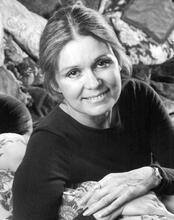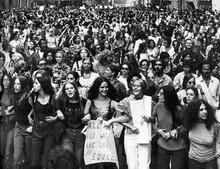Alix Kates Shulman
Alix Kates Shulman is an American radical feminist writer and activist and a leader in the second-wave feminist movement. She is best-known for her 1970 essay, “The Marriage Agreement,” which challenged the acceptance of the “double burden” as ideal and unavoidable, and her best-selling novel, Memoirs of an Ex-Prom Queen (1972). The latter has been recognized as “the first important novel of the Women’s Liberation movement” and a “feminist classic.” In the sardonic feminist coming-of-age novel, Shulman exposed the ubiquity of harassment, violence, and discrimination in young women’s lives, imbuing these issues—often dismissed as trivial—with great urgency. She was honored with a Clara Lemlich Award for a lifetime of social activism in 2018.
Family and Education
Alix Kates Shulman was born in Cleveland, Ohio on August 17, 1932. Her father, Samuel Kates, was a lawyer, and her mother, Dorothy Davis Kates, was the three-time president of the Federation of Jewish Women of Greater Cleveland. Shulman described both as “Roosevelt activists.” Some of her earliest political experiences included discussing her mother’s “anti-antisemitism” work in the Federation around the dinner table and accompanying her mother to a Jewish organizing convention in Atlantic City as a child.
In 1953, Shulman graduated from Case Western Reserve University with a degree in History and English and began a doctoral degree at Columbia University in Philosophy. She left graduate school when it became apparent to her that a career in philosophy was “impossible for women.” She married Marcus Klein in 1954; they were divorced in 1958. In 1959, she married Martin Shulman and had two children, Theodore Shulman (b. 1961) and Polly Shulman (b. 1963). She and Martin divorced in 1985, and she married Scott York in 1989.
While her children were young, Shulman worked as a freelance writer and editor. She also began her activist career in the early 1960s, organizing with CORE (Congress of Racial Equality), taking part in demonstrations against the Vietnam War, and counseling draftees.
Feminist Awakening
In 1967, after years of civil rights activism, Shulman heard about a feminist meeting on the radio. Decades later, in an interview with the Missouri Review in 2011, she would credit this meeting with her feminist awakening. At this New York Radical Women meeting, she remembered that she understood “for the first time…that things did not have to be the way they were, that they could be changed [for women].”
Shulman joined the Women’s Liberation Movement (WLM) shortly thereafter and organized with the radical feminist groups New York Radical Women, the Redstockings, WITCH, and the New York Radical Feminists. She advocated for the legalization of abortion through organizing and participating in protests, street theater, and speak-outs.
In 1968, Shulman co-organized the Miss America protests, the first major action of the movement. The demonstrations targeted the Miss America pageant as degrading to women and emblematic of a culture that valued women’s bodies over their intellect or humanity. The protestors aimed to capture attention and propel the nascent women’s movement onto the national stage. They chanted outside the pageant, distributed literature, and tossed cosmetics and bras into a “freedom trash can” (an episode later mischaracterized as “bra burning”). Shulman withdrew money from her joint account with her husband to pay for a block of tickets for organizers, allowing them protest inside the venue and unfurl a “Women’s Liberation” banner on national television. It was the first time that she felt she had the right to spend money in a way her husband would not have approved of, a decision she recognized as a move towards independence.
A Marriage Agreement (1970)
Two years later, in 1970, Shulman wrote about the rights of women within marriage in the feminist magazine Up from Under. In “A Marriage Agreement,” she criticized the notion that because women earned less or no money, they should be responsible for all domestic responsibilities. She proclaimed: “The ability to earn more money is already a privilege that must not be compounded by enabling the larger earner to buy out his or her duties and put them on the one who earns less.” Years before the phrase “the double burden” was coined, Shulman’s “Marriage Agreement” argued that men and women had equal rights to their own time and must “throw out the old sex roles” and reshape their lives on their own terms. This new life, “on principle,” should involve an equitable division of housework and parenting responsibilities.
To show readers what such a division could look like, Shulman published the marriage contract she and her husband Martin had agreed to, a document that spanned five columns. It specified not only how concrete tasks, such as laundry and the bathing of children, could be alternated between spouses but also how time “on-call” could be divided. Shulman listed what days and times each parent had to be available to answer children’s questions or take them places, take off work if a child became sick, make appointments, or find a babysitter—work that could otherwise be overlooked.
Shulman’s proposal was—and continues to be—both inspiring and deeply controversial. In 1970, it elicited over 2000 letters to the editor and rebukes from public intellectuals, including Norman Mailer and Joan Didion. In 2006, it attracted similar critique and mockery from social critic Caitlin Flanagan. And yet, despite—or even because—of this enduring resistance to Shulman’s contract, it has remained resonant and in print. It was republished in the debut issue of Gloria Steinem’s Ms. magazine in 1972, in Redbook, New York Magazine, and Life, and more recently, in abridged form, in a 2012 issue of Lilith.
In a 2007 interview with Ronnie M. Eldridge, Shulman reflected that she only had the time to write “everything else” because she wrote (and adhered to) the agreement.
Feminist Fiction
Between 1970 and 1971, Shulman published three illustrated children’s books because, as a mother, she wanted books for children that had “positive girl characters” and weren’t “so sexist.” In 1971, she wrote her first book for adults, a biography of Emma Goldman entitled To The Barricades: The Anarchist Life of Emma Goldman (1971), which was honored as a “New York Times Notable Book.”
In 1972, Shulman wrote Memoirs of an Ex-Prom Queen, a best-seller that was heralded as the first novel of Women’s Liberation. “I started writing because I had something urgent to say,” Shulman told the Missouri Review in 2011. “My first novel, Memoirs of an Ex-Prom Queen, is the product of that urgency. I knew there was another view of women’s experience that hadn’t been expressed in fiction…and I knew there was an audience who needed to hear it.” Fiction had the potential to raise women’s consciousness and unite them around common experiences, and in particular, Shulman felt, it had the unique potential to capture the emotional conditions of patriarchy and liberation.
A feminist coming-of-age novel, Memoirs of an Ex-Prom Queen follows Sasha Davis, a typical middle-class girl in the Midwest, through girlhood, college, marriages and motherhood, to her first inklings of consciousness in her thirties. At each new life stage, Sasha’s existence is shaped by, in Shulman’s words, “all the forces of sexism” that had yet to be talked about openly, much less acknowledged as urgent political problems. Some of these forces—including sexual harassment and marital rape—had not yet even been named. Others, like abortion and inequities within marriage, were elevated in the novel to social importance. Through Sasha, Shulman shows how sexual harassment and assault, sexual double standards, job discrimination, and beauty demands influenced women’s lives and limited them, beginning in girlhood.
Memoirs of an Ex-Prom Queen was embraced by feminists, critics, and women not yet involved in the feminist movement. Critics praised its dark humor, nuance, and searing insight. The New York Daily News wrote that it would help women “understand themselves better and be more empathetic toward their own daughters.” The Los Angeles Times wrote that “men owe it to themselves to see themselves plain…by approaching Memoirs as a splendid looking glass.” Meanwhile, Cosmopolitan recognized it as a “vicious little gem of a novel.” It sold over a million copies and broke the record for the highest price paid for reprint rights of a first novel. It has never gone out of print. Women wrote to Shulman to credit her with introducing them to the feminist movement and enabling them to see their own lives through a different lens and to make changes.
Shulman has written four other novels, two of which were also published during feminism’s second wave. Burning Questions (1978), also a feminist coming-of-age novel, begins with a teenager’s feminist consciousness and follows her into a politically active adulthood. On the Stroll (1981) is about a teenage runaway and “a bag lady” on the streets of New York.
Women’s Liberation! Feminist Writings That Inspired a Revolution and Still Can, an anthology Shulman edited with Honor Moore, was published in February 2021.
Teaching and Activism
Though based in New York City and southern Maine, over the last forty years Shulman has taught feminist theory and writing at universities across the United States, including Yale University, the University of Colorado-Boulder, and University of Hawaii. While teaching in Boulder in 1985 and 1986, she protested the Rocky Flats nuclear weapons facility and CIA recruitment on the university campus. In the 1990s, while in Hawaii, she organized a branch of the feminist street theater group, No More Nice Girls.
Shulman has also organized with the feminist group, Take Back the Future, and Women Occupy Wall Street. She has marched with the Women’s March in 2017, 2018, and 2020, and with Black Lives Matter. She has also been an advocate for the elderly, the disabled, and their caretakers since the 1990s. She has written two memoirs about caretaking: A Good Enough Daughter (1999) and To Love What Is (2008).
In 2018, LaborArts and the Remember the Triangle Fire Coalition honored her with a Clara Lemlich Award for her lifetime of social activism.
Her papers are housed at Duke University.
Selected Works by Alix Kates Shulman
Ménage. New York: Other Press, 2012.
To Love What Is. New York: Farrar, Straus and Giroux, 2008
A Good Enough Daughter. New York: Schocken Press, 1999.
Drinking the Rain. New York: Farrar Straus Giroux, 1995.
On the Stroll. New York: Knopf, 1981.
Burning Questions. New York: Thunder’s Mountain Press, 1978.
Memoirs of an Ex-Prom Queen. New York: Knopf, 1972.
To the Barricades: The Anarchist Life of Emma Goldman. New York: Crowell, 1971.
“A Marriage Agreement.” Up from Under, Vol, 1, August/September 1970.
Alix Kates Shulman Website. https://www.alixkshulman.com/index.htm
Antler, Joyce. Jewish Radical Feminism: Voices from the Women’s Liberation Movement. Goldstein-Goren Series in American Jewish History. New York: New York University Press, 2018.
Baumgarder, Jennifer, Alice Stewart, and Kayla Bert. “Take this Crown and…” Women’s Review of Books, Vol. 36, Issue 6, Nov/Dec 2019.
Book, Bella. “An Interview with Alix Kates Shulman.” March 15, 2016. https://jwa.org/blog/interview-with-alix-kates-shulman
Grossman, Patricia. “A Conversation with Alix Kates Shulman” Lilith, May 2012. https://lilith.org/2012/05/a-conversation-with-alix-kates-shulman/
Jewish Women’s Archive. “Alix Kates Shulman.” https://jwa.org/feminism/shulman-alix-kates.
Templin, Charlotte. “An Interview with Alix Kates Shulman.” The Missouri Review, November 2011. https://www.missourireview.com/article/an-interview-with-alix-kates-shu…











